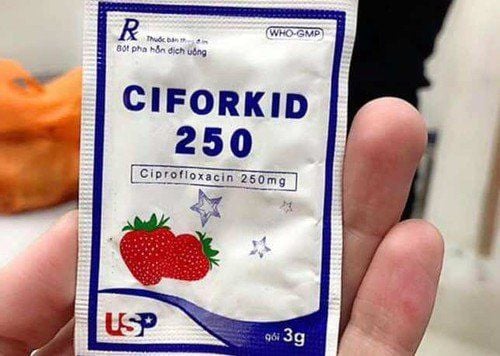This is an automatically translated article.
The article was professionally consulted by Doctor Nguyen Thai Ngoc Chau - Neonatologist - Pediatrics - Neonatology Department - Vinmec Phu Quoc International General HospitalMeconium intestinal obstruction accounts for 33% of all small bowel obstructions in infants. This condition can cause many dangerous complications such as meconium peritonitis, development of jaundice, cholestasis,... Therefore, it is necessary to intervene immediately when detecting meconium intestinal obstruction.
1. Is meconium intestinal obstruction dangerous?
Is meconium intestinal obstruction dangerous is the question of many people. In fact, meconium ileus is an obstruction in the terminal ileum due to a meconium mass. This condition accounts for 33% of cases of small bowel obstruction in infants. It is common in infants with cystic fibrosis. Meconium bowel obstruction is often an early symptom of cystic fibrosis (a disease that causes the gastrointestinal tract to increase secretion of mucus, which sticks to the lining of the intestine). About 10 to 20% of meconium bowel obstructions are clinical manifestations of cystic fibrosis. 80-90% of infants with meconium ileus have cystic fibrosis.
Symptoms of meconium ileus in infants include:
The baby does not pass meconium in the first 12-24 hours after birth; Children with intestinal obstruction: Vomiting (possibly vomiting bile), abdominal distension; Sometimes the dilated small intestine can be palpated, its softness can be felt; The child may develop peritonitis, accompanied by abdominal distension and respiratory distress (if the bowel is perforated). Complications of meconium ileus:
Approximately 50% of cases of meconium ileus in neonates are complications of incomplete rotator cuff, hypoplasia or bowel perforation; Dilated segments of the small intestine can twist during fetal life. If the intestine is not supplied with blood, infarction can lead to meconium peritonitis; The infarcted bowel can be revascularized, causing one or more bowel segments to atrophy; Children with meconium ileus are at increased risk of developing cholestatic jaundice. When diagnosed with meconium intestinal obstruction, the child will be prescribed conservative treatment or surgery.
MORE: Diagnosis and treatment of meconium bowel obstruction in infants
2. Surgical methods for the treatment of meconium bowel obstruction in infants
Laparoscopic surgery for the treatment of meconium bowel obstruction in the newborn is indicated when the patient has perforated meconium with complications of intestinal perforation, intestinal volvulus; when conservative treatment fails or the diagnosis is uncertain. Contraindicated for people with blood clotting disorders.
2.1 Preparation
Personnel performing: Pediatric surgeon, experienced in the field of gastrointestinal surgery; Technical facilities: Specialized surgical instruments, consumables, digestive surgery equipment; Patient: Have a full range of diagnostic tests, diagnose the possibility of surgery; nutritional supplements, water, electrolytes; put a gastric suction tube; prophylactic antibiotic use; explain to the family about the medical condition, the possibility of surgery, the risk of complications,...; Medical records: Complete all prescribed procedures.
2.2 Carrying out surgery
Check records: Indications, contraindications, commitment to agree to perform the procedure; Checking the patient: Checking the whole body condition; Patient position and operating team position: The patient lies along the anesthesia table, the surgeon stands on the right side of the patient, the surgical assistant stands on the left side of the patient; Skin incision: Incision of the skin along the middle white line above the navel; Stages of surgery: Intestinal dissection, irrigation, and meconium into the colon.

2.3 Follow-up after surgery
Maintain body temperature, use an incubator for the child; Balance water, electrolytes and blood transfusion if necessary; Give complete parenteral nutrition for at least the first 3 days; Intermittent aspiration of gastric juice until there is no bile. At that time, the baby can be breastfed with an increasing amount of milk; If a nasogastric tube is placed through the anastomosis, pump milk through the catheter from the 3rd day after surgery to feed the baby early; Use anti-inflammatory antibiotics.
2.4. Risk of complications and how to manage
Intestinal obstruction: Re-operation is required; Intestinal volvulus: Needs surgery again; Anastomosis podium: Need surgery to redo the anastomosis or drain the ileum. Meconium bowel obstruction in infants can lead to many dangerous complications. Therefore, when seeing a child showing signs of illness, parents need to immediately take the child to a doctor for timely intervention and treatment.As a disease that can cause dangerous complications, when parents see that their child has signs of meconium bowel obstruction, parents can take the child to Vinmec International General Hospital for examination, diagnosis and treatment. Here, there is a team of well-trained pediatricians with high technical qualifications, rich experience in the treatment of diseases of infants, children and children under 16 years old. Vinmec is equipped with a system of modern and advanced medical supplies and professional service quality that will support high efficiency in diagnosis and treatment of patients.
Please dial HOTLINE for more information or register for an appointment HERE. Download MyVinmec app to make appointments faster and to manage your bookings easily.














